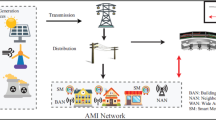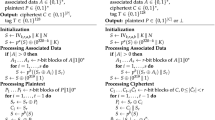Abstract
In a smart grid environment, smart meters periodically collect and report information such as electricity consumption of users to a control center for timely monitoring, billing and other analytical purposes. There is, however, a need to ensure the privacy of user data, particularly when the data is combined with data from other sources. In this paper, we propose a new fine-grained data analysis (hereafter referred to as FGDA) scheme for privacy preserving smart grid communications. FGDA is designed to compute multifunctional data analysis (such as average, variance, and skewness) based on users’ ciphertexts, as well as supporting fault tolerance feature. We remark that FGDA can still function when some smart meters fail. Compared to existing schemes providing both the properties of multifunction and fault tolerance, FGDA is more efficient in terms of computation overheads. This is because FDGA does not use bilinear map or Pollard’s lambda method during decryption. We also demonstrate that FGDA achieves a higher communication efficiency, as the gateway only needs to send the ciphertext to the control center once even for different statistical functions.







Similar content being viewed by others
References
Heydt GT (2010) The next generation of power distribution systems. IEEE Trans Smart Grid 1(3):225–235
Li B, Lu R, Wang W et al (2017) Distributed host-based collaborative detection for false data injection attacks in smart grid cyber-physical system. J Parallel Distrib Comput 103:32–41
Liu J, Yu X, Xu Z et al (2017) A cloud-based taxi trace mining framework for smart city. Soft Practice and Exper 47(8):1081– 1094
Choo KKR (2014) A conceptual interdisciplinary plug-and-play cyber security framework. In: ICTs and the millennium development goals. Springer US, pp 81–99
Yan Y, Qian Y, Sharif H et al (2012) A survey on cyber security for smart grid communications. IEEE Commun Surv Tutorials 14(4):998–1010
Li X, Liang X, Lu R et al (2012) Securing smart grid: cyber attacks, countermeasures, and challenges. IEEE Commun Mag 8(50):38–45
Pindoriya NM, Dasgupta D, Srinivasan D et al (2013) Infrastructure security for smart electric grids: a survey. In: Optimization and security challenges in smart power grids. Springer Berlin Heidelberg, pp 161–180
Bao H, Lu R (2015) A new differentially private data aggregation with fault tolerance for smart grid communications. IEEE Internet Things J 2(3):248–258
Chen L, Lu R, Cao Z (2015) PDAFT: A privacy-preserving data aggregation scheme with fault tolerance for smart grid communications. Peer-to-Peer Netw Appl 8(6):1122–1132
Chen L, Lu R, Cao Z et al (2015) MuDA: Multifunctional data aggregation in privacy-preserving smart grid communications. Peer-to-peer Netw Appl 8(5):777–792
Erkin Z (2015) Private data aggregation with groups for smart grids in a dynamic setting using CRT. In: 2015 IEEE international workshop on information forensics and security (WIFS), pp 1–6
Erkin Z, Tsudik G (2012) Private computation of spatial and temporal power consumption with smart meters. In: ACNS, vol 12, pp 561–577
Lu R, Alharbi K, Lin X et al (2015) A novel privacy-preserving set aggregation scheme for smart grid communications. In: 2015 IEEE global communications conference (GLOBECOM) , pp 1–6
Lu R, Liang X, Li X et al (2012) Eppa: An efficient and privacy-preserving aggregation scheme for secure smart grid communications. IEEE Trans Parallel Distrib Syst 23(9):1621–1631
Ni J, Zhang K, Lin X et al (2016) EDAT: Efficient data aggregation without TTP for privacy-assured smart metering. In: 2016 IEEE international conference on communications (ICC), pp 1–6
Shi Z, Sun R, Lu R et al (2015) Diverse grouping-based aggregation protocol with error detection for smart grid communications. IEEE Trans Smart Grid 6(6):2856–2868
Xie CR, Zhang RY (2015) Privacy-preserving power consumption data measuring protocol for smart grid. In: Proceedings of international conference on computer information systems and industrial applications, CISIA
Paillier P (1999) Public-key cryptosystems based on composite degree residuosity classes. In: Eurocrypt, vol 99, pp 223–238
Boneh D, Goh EJ, Nissim K (2005) Evaluating 2-DNF formulas on ciphertexts, vol 3378, pp 325–341
Hu L, Evans D (2003) Secure aggregation for wireless networks. In: 2003 symposium on applications and the internet workshops, 2003. Proceedings, pp 384–391
Mahimkar A, Rappaport TS (2004) SecureDAV: a secure data aggregation and verification protocol for sensor networks. In: Global telecommunications conference, 2004. GLOBECOM’04, vol 4. IEEE, pp 2175–2179
Przydatek B, Song D, Perrig A (2003) SIA: Secure information aggregation in sensor networks. In: Proceedings of the 1st international conference on Embedded networked sensor systems, pp 255–265
Sui Z, Niedermeier M, de Meer H (2015) RESA: a robust and efficient secure aggregation scheme in smart grids. In: International conference on critical information infrastructures security. Springer, Cham, pp 171–182
Liang X, Li X, Lu R et al (2013) UDP: Usage-based dynamic pricing with privacy preservation for smart grid. IEEE Trans Smart Grid 4(1):141–150
Lin HY, Tzeng WG, Shen ST et al (2012) A practical smart metering system supporting privacy preserving billing and load monitoring. In: Applied cryptography and network security. Springer Berlin/Heidelberg, pp 544–560
Kursawe K, Danezis G, Kohlweiss M (2011) Privacy-friendly aggregation for the smart-grid. In: International symposium on privacy enhancing technologies symposium. Springer, Berlin, Heidelberg, pp 175–191
Acknowledgments
The work was supported in part by the NSFC-Zhejiang Joint Fund for the Integration of Industrialization and Informatization under Grant No. U1509219, the National Natural Science Foundation of China under Grant No. 61632012, the Shanghai Natural Science Foundation under Grant No. 17ZR1408400, and the Shanghai Sailing Program under Grant No. 17YF1404300. This work and the preparation of this publication were funded in part by monies provided by CPS Energy through an agreement with The University of Texas at San Antonio.
Author information
Authors and Affiliations
Corresponding author
Rights and permissions
About this article
Cite this article
Ge, S., Zeng, P., Lu, R. et al. FGDA: Fine-grained data analysis in privacy-preserving smart grid communications. Peer-to-Peer Netw. Appl. 11, 966–978 (2018). https://doi.org/10.1007/s12083-017-0618-9
Received:
Accepted:
Published:
Issue Date:
DOI: https://doi.org/10.1007/s12083-017-0618-9




